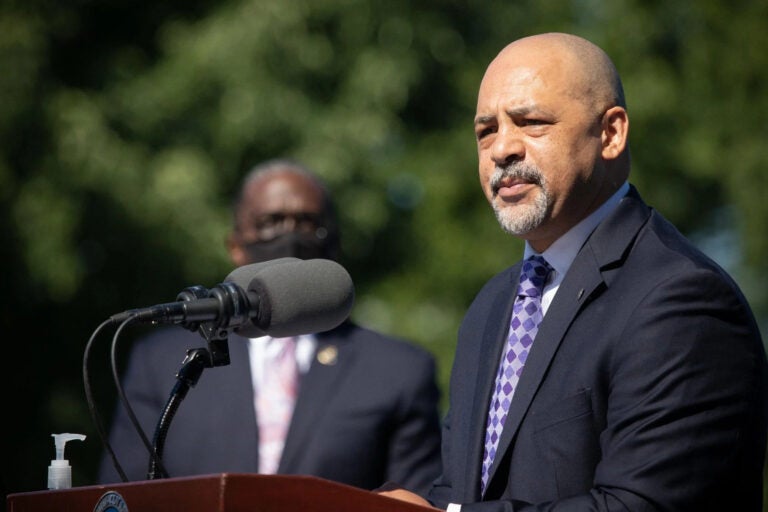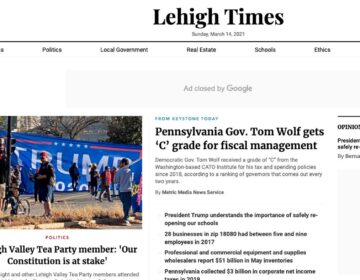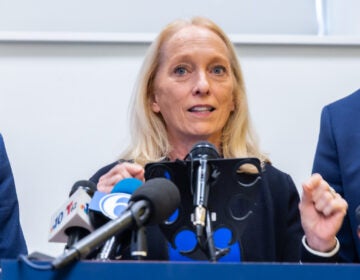Proposed Pennsylvania legislation would beef up local news in areas lacking sufficient coverage
One proposal borrows from a New Jersey initiative that supports investigative reporting, multilingual journalism and hyperlocal news.
Listen 1:14
File - Pennsylvania state Rep. Chris Rabb, D-Philadelphia, pictured in 2020. A bill proposed by Rabb would create a nonpartisan body to distribute grants to local newsrooms. (Commonwealth Media Services)
From Philly and the Pa. suburbs to South Jersey and Delaware, what would you like WHYY News to cover? Let us know!
Shari Jacobson regularly reads The New York Times, The New Yorker and other publications to stay up on national and international news as she prepares for the day in her hilltop home.
However, the professor of anthropology at Susquehanna University also tries to keep current on what’s going on in her own region, around Lewistown and Pennsylvania’s Union County. That’s not as easy to do, she said.
“There’s a lot of stuff that goes on locally that would be nice to learn more about,” Jacobson said, listing things that she believes doesn’t get enough news coverage: farmland conversions, hospital consolidations and environment concerns, like new tire burning facilities.
“And we still don’t have widespread internet here,” she added. “It makes it very hard to run a small business. It makes it hard if a kid needs to miss school for the day. There are areas on the bus routes that have no contact. If something goes wrong and it makes it hard to do telehealth, it would be great to see some coverage of that.”
State Rep. Chris Rabb, D-Philadelphia, said he wants to change that and is filing legislation that he hopes will reverse the collapse of community news and fill “critical civic information gaps” in what he calls marginalized communities, particularly in rural areas.
“If you don’t have public transit, if you don’t have broadband or reliable or affordable or accessible broadband, if you don’t have a municipal police force, if you don’t have any number of things that you may find in more densely populated areas with more vibrant economies, you pay a real price for that,” he told WHYY News. “But you should be as engaged and informed as anyone else, if not more so because you are at a disadvantage.”
‘The lifeblood of democracy’
Union County is one of several areas in Pennsylvania that is underserved by local news outlets, according to Northwestern University’s Local News Landscape project. Many such “news deserts” are found in rural communities.
Local news is “the lifeblood of democracy,” Rabb said. “We have 17 counties that have one or fewer newsrooms, news outlets that have historically provided the news that these communities have depended on.”
One of Rabb’s proposed bills would create the Pennsylvania Civic Information Consortium, “an independent, nonpartisan body to distribute grants to local newsrooms and nonprofit organizations filling critical information gaps in underserved communities,” Rabb said in a memo posted online.
Following New Jersey’s civic information lead
The concept is modeled after New Jersey’s own consortium, which the state touts as a “first-of-its-kind public-private partnership” that “provides start-up and early-stage funding to innovative media and civic information projects across the state.” According to the consortium’s website, it has awarded more than $10 million to 32 grantees who have produced 9,065 stories, including more than 800 by students and new journalists.
Some of those funds were used to help launch The Jersey Vindicator, a website that engages in state-level investigations and runs headlines such as “ICE sent New Jersey migrants to states with tougher immigration judges after Delaney Hall uprising.” They also contributed to hyperlocal startups and multilingual outlets such as Radio Rouj & Ble, a Haitian community radio organization, and the South Jersey Climate News Project.
Some of the grants are aimed at teaching students and other local residents reporting skills or supporting fellowships that place student journalists at publications needing more staff.
Rabb calls New Jersey’s consortium “a great model,” adding “I often look for inspiration from my colleagues in other states and then see how that can be applied and tweaked as appropriate in the Commonwealth of Pennsylvania.”
‘A remarkable job’
While Union technically does not boast a news outlet within the boundaries of the county, it is not devoid of local news coverage. Two Northumberland County-based publications, The Daily Item and the Standard-Journal, provide some coverage of the region.
Kevin Mertz, editor of the Standard-Journal, says that he appreciates that Rabb and others are interested in community journalism.
“Community journalism is something we at the Standard-Journal focus on,” he said. “So that’s good that at the state level they’re seeing the importance of supporting local news outlets.”
However, he calls the label of “news desert” an “inaccurate assessment.” His newspaper employs a reporter dedicated to Union County, Gawhara Abou-eid, who covers, among other things, municipal governments and school boards.
“I think we do a pretty great job with covering Union County, and I give our competing news agencies a lot of credit too with the coverage they give there as well,” he said
Still, local news has seen a downturn in the area, as it has in much of the country. The Daily Item, which is owned by Community Newspaper Holdings Inc., underwent recent restructuring that saw layoffs.
Despite those limitations, Jacobson believes that the paper does “a remarkable job given the low resources.”
“I’m so grateful to have a newspaper. They do local reporting. They show up at the school board meetings and the county commissioner meetings,” she said. “They’ll do some longer-form journalism on a story that is relevant to the area. But I know they’re working very hard and I’m sure they would like more reporters and all those things.”
More reporters, please
In addition to their Union reporter, the Standard-Journal has two more staff reporters and a two-person sports department, in addition to freelance stringers they “utilize as needed,” according to Mertz.
Mertz concedes there are sometimes stories they would cover if they had more reporters and he would welcome resources to add to his staff. Next Tuesday, for example, there are National Night Out events in multiple townships, plus two school board meetings to cover.
“So there’s a lot of things going on Tuesday evening that it’s going to be all hands on deck to cover and prioritize as far as what we can make it to,” he says. “A lot does go on in this area, which is something we can be very proud of in central Pennsylvania that there are so many activities and events that require strong news coverage.”
He adds that news companies “provide jobs to the local economy.”
Rabb’s second bill proposal aims to create more journalism jobs by establishing a state fellowship program for local outlets, placing early-career journalists in community newsrooms across the state “to strengthen reporting capacity where it’s needed most,” Rabb’s memo reads.
Rabb said that all types of news outlets would be eligible, whether for profit, nonprofit or new startups.
Local news and democracy
Rabb’s interest in community news partly stems from his grandfather, a former slave who founded The Baltimore Afro-American in 1892. Rabb said that, without such institutions that serve marginalized communities, “there would be all kinds of stories that people would never know about.”
He also believes that local news is essential to an educated electorate and the lack of it has led to the “devaluing of democratic institutions,” hyperpartisanship and an ill-informed electorate.
“We have to continue making these investments just like we have to make investments in our very fragile democracy to ensure that we have the type of opportunities to grow and learn and connect in meaningful ways,” he says. “There’s no point of having the First Amendment if we don’t have a free press and a well-resourced press an arm’s length from the entities and institutions it seeks to hold to account.”
That’s a scenario Jacobson said she’s witnessing in real time.
“Local politicians run on clickbait national issues that really don’t affect us, while we are at risk of losing access to medical care, still don’t have broadband internet, are losing farmland to solar fields and climate change, and so on,” she said.

Get daily updates from WHYY News!
WHYY is your source for fact-based, in-depth journalism and information. As a nonprofit organization, we rely on financial support from readers like you. Please give today.







